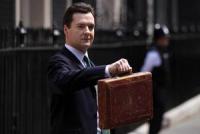Autumn statement 2011: Osborne confirms scheme infrastructure plans
Pension schemes will help fund 500 infrastructure projects nationwide over the next 10 years, the chancellor of the Exchequer announced today.
In his autumn statement, George Osborne told the House of Commons "two groups of pension funds" have committed £20bn to the projects, discussions about which were first revealed by PW earlier this month.
The expenditure has already been earmarked for 35 projects, which will focus on road and rail development, with plans for improvements to the trans-Pennine railway line, the Metro underground rail system in Newcastle and its surrounding area and the M25, M3 and M56 motorways among those listed by the chancellor for investment.
Osborne also defended the government's public sector reforms ahead of tomorrow's strike by members of several unions. He called the plans "fair", adding: "I would once again ask the unions to call off their strikes tomorrow, come back to the table and complete the negotiations."
And he announced unspecified plans to "take action to stop some large firms using complex asset-backed pension funding arrangements to claim double the amount of tax relief that was intended".
The state pension will rise £5.30 per week next year to around £147, joined by a £5.35 increase in pensions credit, funded by reductions in other benefits. Osborne also confirmed the state pension age will rise from 66 to 67 in 2026.
The government is also pledging to build a new social home for every one sold under a new 'right to buy' discount of 50%. Growing increase in social housing as an income generating asset class has seen M&G launch the first fund offering the asset class last year, which has its first close at a suspected £200bn this week.
On the economy, parliament heard the Office for Budgetary Responsibility (OBR) is now predicting just 0.9% Gross Domestic Product growth next year, having previously forecasted 1.7%. The anticipated 2.5% growth next year has also been downgraded significantly to 0.7%.
Meanwhile government borrowing is expected to be £112bn more over the course of the current parliament than previous predictions, while the OBR has now claimed unemployment will reach 8.7%, only falling to 6.2% by 2015.
The government measures to try to stimulate economic growth included a 1% reduction in the main rate of corporation tax - to 25% - to next April and a 50% income tax reduction for start up businesses involving more than £100,000 investment. He also raised the banking levy to 0.088%.
Shadow chancellor Ed Balls responded by accusing Osborne of showing "a catastrophic error of judgement" in his growth plans, adding: "For his party's sake and in the national interest, the chancellor needs to change course."
He also criticised the government being "determined" to "raid" public sector workers’ pensions and not trying to get private sector investment in government infrastructure projects sooner.
Most Viewed
- What does Labour have in store for the pensions industry?
- LGPS latest: GLIL backers invest £475m for UK infrastructure push
- Dashboard costs rose by 23% in 2023, figures show
- Border to Coast launches UK strategy in major private markets push
- How the pensions industry can better support people with mental health problems


